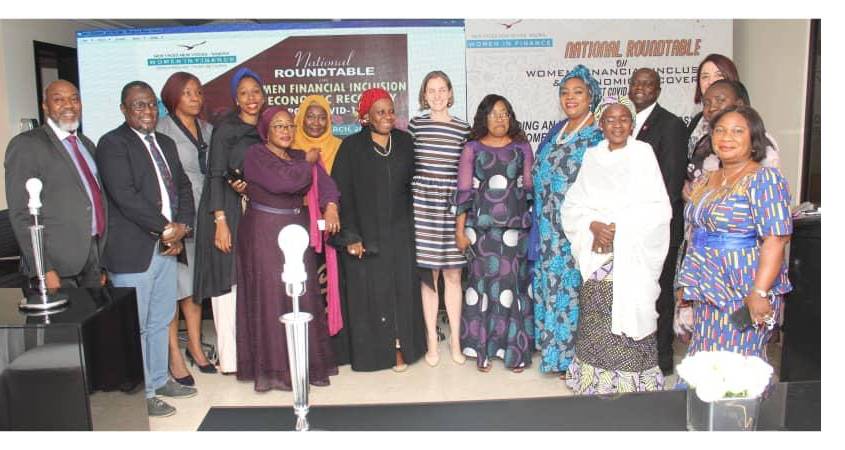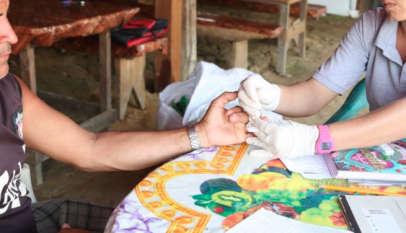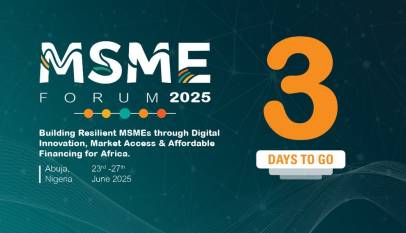Covid-19: NFNV-Nigeria’s roundtable underscores women’s financial inclusion, economic recovery
The Nigeria chapter of New Faces New Voices (NFNV), last week, hosted the preliminary edition of its national roundtables on women’s financial inclusion and economic recovery, post Covid-19, in conjunction with the Graça Machel Trust (GMT) and the Central Bank of Nigeria (CBN).
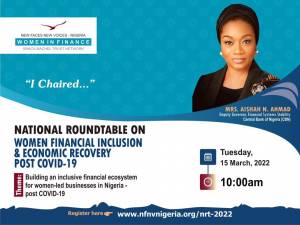
By Adam Alqali
The national roundtable was an outcome of GMT’s recent convening of a high-level Expert Leaders Group (ELG) on Women’s Financial Inclusion in the Digital Economy in Africa, which consists of female Deputy Governors (DGs) of African Central Banks and senior financial sector leaders aimed at building inclusive economies, post-Covid-19. Accordingly, the roundtable, which held in Abuja, Nigeria was themed: “Building an inclusive financial ecosystem for women-led businesses in Nigeria – post-Covid-19.’’
Among others, the roundtable was focused on assessing the inclusiveness of government’s financial policies, programmes and interventions aimed at mitigating the impact of the pandemic on women-owned businesses; assessing policies and programmes aimed at promoting inclusive digitalisation as well as ensuring gender-inclusive post Covid-19 recovery efforts.
“NFNV Nigeria empowering women entrepreneurs across West Africa” – Country Director
Country Director of NFNV Nigeria, Mrs Aishatu Debola Aminu, said NFNV Nigeria had been empowering women entrepreneurs not only in Nigeria but across the West African region by facilitating the export of their products through its initiative, the West African Cross-border Women Traders Association (AFOACT), which had been yielding positive results for women in business.
Mrs Aminu said the roundtable aimed to build a strategic partnership to improve women’s access to digital finance and entrepreneurship financing towards achieving financial inclusion. “This National Roundtable has become even more crucial and expedient because of the strategic repositioning of nations worldwide, including Nigeria, to recover from the devastating effects of the Covid-19 pandemic. We are all aware of economic and social disruptions that have affected business enterprises, particularly women-owned businesses.”
“I’d work with NFNV Nigeria as part of my role as a GMT Expert Leader to foster women’s financial inclusion” – DG CBN
Mrs Aishah Ahmad, Deputy Governor of the Central Bank of Nigeria (CBN), who chaired the roundtable, delivered the keynote address in which she noted that women constitute about 70% of the global health workforce, hence were not only most exposed to the pandemic’s health impact but also faced increased levels of domestic violence. She said while women employed in the informal sector were disproportionately affected by Covid-19-induced lockdowns, others employed in the formal sector had experienced large pay cuts and layoffs.
In view of that, the DG of CBN said she was keen on working with GMT and NFNV Nigeria to foster women’s financial inclusion through the continent-wide ELG aimed at tackling the most crucial Covid-19-induced economic challenges faced by women, by not only ensuring women equitably benefit from economic stimulus to combat the negative effects of Covid-19 but also that they were involved in key decision-making on issues that affect them.
“We are advocating for women’s representation in Covid-19 relief interventions and in accelerating financial inclusion for female-owned businesses. We see digital financial services as an anchor and a route to achieving that objective. We are also advocating for financing women-owned businesses from the available Covid-19 relief interventions, as we will also seek to broadly promote women’s MSMEs access to finance, ’’ she assured.
Mrs. Ahmad said in a bid to drive inclusive economic growth, CBN had deployed several SME-targeted interventions during the pandemic, including the $50 billion Targeted Credit Facility disbursed to over 700,000 beneficiaries, 45% of which had been disbursed to women as at January 2022. In addition, she said women constitute 33% of the beneficiaries of the Agri-Business/Small and Medium Enterprises Investment Scheme (AGSMEIS), just as 60.3% of beneficiaries of the CBN’s Micro, Small and Medium Enterprises Development Fund (MSMEDF) were women.
“We recently launched the Framework for Advancing Women’s Financial Inclusion in Nigeria aimed at closing the gender gap in financial inclusion which is 8% in Nigeria and 9% globally. This is a platform for dialogue to develop strategies and initiatives for policymakers to implement. For us to grow an economically sustainable country, region and world, we need to be deliberate in the policies, interventions and regulations we come up with and this roundtable will go a long way in ensuring that,’’ the DG of CBN concluded.
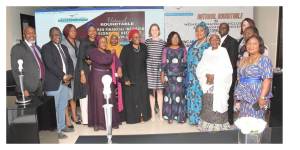
NFNV Nigeria enhances women’s access to financial inclusion – Ecobank ED
Ms Carol Oyedeji, executive director for commercial banking at Ecobank Nigeria described SMEs as the ‘engine room’ of every economy, just as women’s financial inclusion was an important enabler for Nigeria’s overall economic development. Ms Oyedeji, said while 1 in 4 African entrepreneurs is a female, research had shown Nigeria to be the country with the highest numbers of female entrepreneurs in the world, hence the potentially huge impact of ensuring equitable access to formal financial services for women in boosting the country’s economy.
“The idea of trying to empower women with business information and capacity building to ensure they are able to scale up their businesses is one sure way of ensuring women have access to formal finance. Creating the platform for various stakeholders to network and share ideas and strategies for helping women will ensure a wider pool of women learn about these interesting ideas which will definitely help the wider society.
“The level of participation and enthusiasm among participants in the roundtable proves they have been exposed to a lot of new information and ideas. I believe the women entrepreneurs will go forward acting as ambassadors who will take some of the information to the grassroots to ensure more women are equipped with the right information for access to financing and the know-how to scale their businesses, from a knowledge perspective,” Ms Oyedeji assured.
NFNV roundtable fostering collaboration to achieve financial inclusion – EFInA CEO.
Ms Ashley Immanuel, CEO of Enhancing Financial Innovation and Access (EFInA), was certain that MSMEs who encompass a significant percentage of Nigeria’s employment network, contribute significantly to the country’s GDP and to the overall wellbeing of the country’s citizens, emphasizing that women-led micro enterprises were excessively affected by the economic fallout of the Covid-19 pandemic.
Therefore, Ms Immanuel said building the capacity of women-led SMEs was key to driving the next phase of Nigeria’s economic growth, adding that investment in women-led SMEs as well as their financial inclusion would help them quickly recover from the negative effects of the pandemic which had exacerbated pre-existing challenges of women-owned SMEs with disastrous consequences on households.
“The major takeaway from this roundtable is the understanding of key initiatives and interventions for women’s financial inclusion by many stakeholders, along with their opportunities for collaboration. A lot of us who participated in this roundtable have realized the need for stakeholders to begin to collaborate with one another. The government is investing a lot of resources in support of women-run SMEs. As such, if we work together, we can make those investments as effective as possible,” Immanuel assured.
“I gained new information on where and how to access funding ’’ Ms Nomhwange
One of the roundtable participants, Ms Kate Nomhwange, an edupreneur, said other than the opportunity to network with fellow women entrepreneurs, the NFNV Nigeria roundtable was a ‘wake-up call’ for the participants, one that exposed her to a lot of private initiatives and interventions on financial inclusion and economic recovery – against the prevailing tendency of women entrepreneurs to focus only on government-owned financing schemes.
“The lack of information on access to financing for women-owned businesses is a challenge many are facing, however the roundtable has introduced us to those alternative financing opportunities. It will help women entrepreneurs become more resilient to the shocks created by Covid-19 as they seek to scale up their businesses beyond the pandemic. Personally, I have gained new information on where and how to access funding for my business,’’ Ms Nomhwange admits.
The NFNV Nigeria national roundtable was attended by leading Nigerian women finance experts, established and upcoming women entrepreneurs. It therefore fostered exchange of ideas between the experts with wealth of knowledge and expertise and the budding and experienced women entrepreneurs. NFNV Nigeria hopes the roundtable will stimulate further conversations on building an all-inclusive financial ecosystem for women-owned/led businesses to thrive in Nigeria, post Covid-19.

